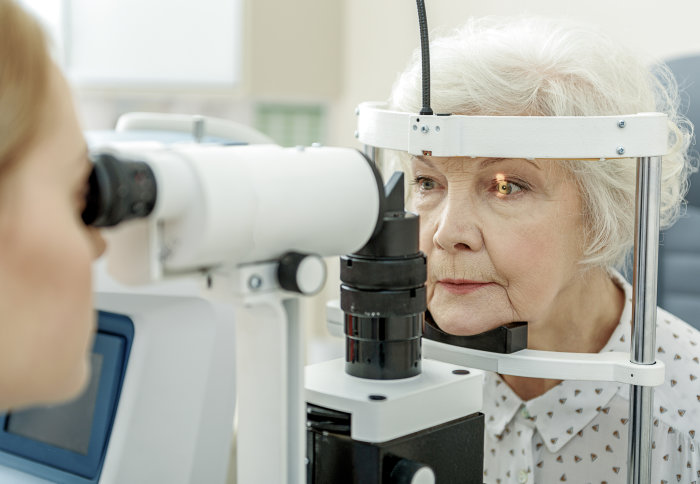Sight loss in focus, and awarding women in science: News from the College

Here’s a batch of fresh news and announcements from across Imperial.
From research into preventing blindness in glaucoma, to a women in science fellowship for an Imperial chemical engineer, here is some quick-read news from across the College.
Eyes on research
 Imperial bioengineers are teaming up with MIT and Duke University to focus on factors in sight loss.
Imperial bioengineers are teaming up with MIT and Duke University to focus on factors in sight loss.
Drs Darryl Overby and Sam Au, from the Department of Bioengineering, will use new ‘organ-on-a-chip’ technology to study the effects of changing eye pressure, as well as the effectiveness of new drugs. The device, which will contain human eye cells, mimics the flow of fluid as it drains from the eye and could help to investigate the drivers of glaucoma.
Dr Overby said: “This will ultimately allow us to develop better drugs that more effectively lower eye pressure and prevent blindness in glaucoma.”
Funder, Fight for Sight, which will provide £100,000 to support the project, says the approach “could offer solutions for this leading cause of sight loss”.
Read the full story on the Fight for Sight website.
Ammonia win
 Ammonia is one of the most widely used chemicals, playing a key role in making fertilisers, plastics, explosives, textiles, pesticides, dyes and other chemicals.
Ammonia is one of the most widely used chemicals, playing a key role in making fertilisers, plastics, explosives, textiles, pesticides, dyes and other chemicals.
However, making ammonia via the Haber Bosch process consumes colossal amounts of fossil fuels and emits more than one percent of the world’s carbon dioxide – so scientists are working towards making ammonia production sustainable.
The Technical University of Denmark, Stanford University and Imperial have now published a Nature paper that confirms that electrochemical processes can produce ammonia at room temperature and ambient pressures.
Co-author Dr Ifan Stephens, from Imperial’s Department of Materials, said: “Our protocol provides unequivocal and quantitative evidence that ammonia synthesis is possible using electrochemistry, without the high temperatures and pressures needed for the Haber Bosch process. We are now looking for ways of making the reaction work efficiently. Should we be successful, we could produce green ammonia on a large scale, using water, air and renewable electricity.”
Read the protocol and paper in Nature: A rigorous electrochemical ammonia synthesis protocol with quantitative isotope measurements.
Smart data analytics for smarter power grid
 The power grid delivers electricity to our factories, services, and homes - but like any system, it’s prone to inefficiencies, and can bend under the pressure of ever increasing demand.
The power grid delivers electricity to our factories, services, and homes - but like any system, it’s prone to inefficiencies, and can bend under the pressure of ever increasing demand.
Now, through two papers published in IEEE Signal Processing Magazine, Imperial researchers have demonstrated how to teach the old dog that is the power grid some new tricks.
Lead author Professor Danilo Mandic from the Department of Electrical and Electronic Engineering said: “Using the current power grid is like driving a vintage car - it moves along fine but doesn’t like steep hills or meandering roads. If we use smart data analytics methods to identify ‘hills and bends’ in the smart power system then we can do much better. These ’hills and bends‘ are effectively frequency changes caused by a mismatch between power generation and its consumption. It’s worsened by voltage imbalances causing inaccurate power readings
Co-author Professor Anthony Constantinides from the same department said: “Data analytics here enable the creation of self-balancing transforms which guarantee correct evaluation of system parameters under various disturbances. This could prevent false alarms let the smart grid with the ability to detect and perhaps even fix faults and imbalances by itself without human input.”
Read the papers here and here.
Women in Science award

Imperial’s Dr Sepideh Khodaparast received the L’Oreal-Unesco Women in Science Fellowship (FWIS) 2019 at a ceremony in the Houses of Parliament on 15 May.
Dr Khodaparast, of the Department of Chemical Engineering won the award for her work on developing new tools to address the global threat of antimicrobial resistance.
She said: “It’s an honour to receive this award and recognition for my research.”
The award will help her to establish the scientific collaborations and develop the technical tools that are essential to her interdisciplinary research.
The Fellowship, worth £15,000, is awarded annually to five early career researchers from across the globe. It is designed to provide flexible and practical support to enable recipients to further their research and careers.
Dr Khodaparast’s supervisor Professor Joao Cabral added: “This award recognises Sepideh as an outstanding researcher, who combines vision with hard work, and leadership with generosity.”
–
Want to be kept up to date on news at Imperial?
Sign up for our free quick-read daily e-newsletter, Imperial Today.

Article text (excluding photos or graphics) © Imperial College London.
Photos and graphics subject to third party copyright used with permission or © Imperial College London.
Reporter
Ryan O'Hare
Communications Division
Caroline Brogan
Communications Division
Sara West
Communications Division
Andrew Youngson
Communications Division